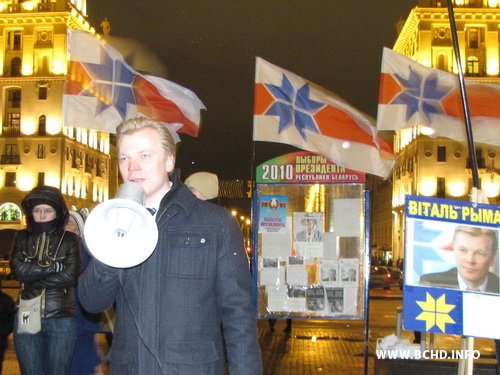
Sanctions and Scuffles: The Response to Repression in Belarus
Publication: Eurasia Daily Monitor Volume: 9 Issue: 38
By:

The past few weeks in Belarus have seen an unseemly squabble between various sectors of what can loosely be termed as “the opposition.” The reason has been the failure of the Coalition of Six to agree on a strategy for the parliamentary elections, and the debate over the effectiveness of sanctions, which have since been expanded in scope by the European Council, with the likelihood of more names being added to the current list of 201 when the EU Foreign Ministers meet at the end of February.
The Coalition of Six consists of the following parties or groups: the Belarusian Popular Front, the United Civic Party, A Fair World, the Movement for Freedom, the unregistered Belarusian Christian Democratic Party and Tell the Truth. They had planned to sign an agreement on January 31, but one of the party leaders, Vital Rymasheuski of the BCDP, was incensed that the others planned to read a version of the agreement at a press conference that he maintained had not been agreed upon previously. A minor fracas ensued when he pushed Tell the Truth’s Alyaksandr Feduta aside, and the latter then aimed a kick at him from behind.
Subsequently, during an interview with Radio Liberty, Rymasheuski revealed an initiative by the Office for a Democratic Belarus (ODB) in Brussels, supported by the Belarusian Institute for Strategic Studies, which involved sending a text to MEPs requesting that the principles of the sanctions against Belarus be amended. Volha Stuzhinskaya, the head of the ODB, maintains that sanctions have been ineffective, and she suggested that the list be reduced by 25 members, to exclude university rectors, the lone businessman Uladzimir Peftieu, and others who had been on the list since 2006 but had since left office, as well as one person who is now deceased. Instead, she advocated that those involved in the recent case against Vyasna leader Ales Byalatsky should be added to the list (www.charter97.org, February 15; www.regnum.by, February 8).
In several recent articles, members of BISS have echoed Stuzhinskaya’s view that sanctions have not been effective. Aleksey Pikulik, the Academic Director of BISS, wrote for example that in a situation in which a full-scale embargo is impossible as Russia continues to subsidize Belarus, sanctions lead only to the further isolation of the latter. Isolation, he believes, will result in further authoritarian consolidation, whereas increasing contacts with Belarusian society, including the bureaucracy, is potentially an effective means of improving the situation in the country. He notes further that the EU position to target those who support the Lukashenka regime or receive benefits from it is absurd because it encompasses practically all residents of Belarus (www.naviny.by, February 7). Stuzhinskaya also states in an interview with Radio Svaboda that expanding the list might lead to a new round of repressions (www.democraticbelarus.eu, February 20).
The reaction to such ideas from opposition circles was extremely hostile, particularly in view of the ostensible secrecy of the communications between ODB and the EU. Former presidential candidate Ales Mikhalevic, who now has refugee status in the Czech Republic, denounced it (as did many others) on the website of Charter 97. He maintained that Peftieu had offered $1 million to anyone who could remove him from the “black list.” He maintains that this offer was attractive to people who “unselfishly love money,” accusing Stuzhinskaya of being among their number. He maintained also that ODB and BISS work under the auspices of PACT, led by Balasz Jarabik. According to Mikhalevic, Jarabik has suggested that KGB approval should be sought for civil democracy projects in Belarus (www.charter97.org, February 8). Valyantsin Stefanovich, the deputy chairman of Vyasna, commented that no one had consulted human rights defenders on these issues and stated that it is premature to be speaking about lifting sanctions before all political prisoners are released (www.charter97.org, February 14).
A more reasoned critique came from the head of the Vitsebsk organization Nash Dom, Volha Karatch, who claims she was not permitted to see the text of the ODB letter beforehand. She maintains that many of those suggested for removal from the travel ban list had committed brutal crimes, such as Leanid Farmagey, the former head of Minsk City Council (dismissed last summer), whereas the judge who sentenced Byalatsky is “an ordinary judge” who condemned just one person. Uladzimir Peftiev is the head of the Beltekheksport company that is involved in arms trading, a reprehensible occupation in her view. The travel ban list was drawn up not based on what positions people occupied but on “specific human rights violation actions,” which were often major crimes even according to Belarusian laws (Nash Dom, February 6). She notes also that when the EU began to widen the list of banned officials, several regional judges at once acquitted activists charged with distributing leaflets, illustrating that such measures bring results (www.democraticbelarus.eu, February 20).
The European Council did not act on the advice of the ODB or BISS and has chosen to expand the criteria for sanctions and assets freezing. Both sides on this issue raise legitimate questions, the vitriol notwithstanding. Partial sanctions rarely lead to fundamental changes in authoritarian regimes; reduction of sanctions appears as a negation of the immense suffering endured by political prisoners and the protesters of December 19, 2010. However, the argument that sanctions only push Belarus into the Russian orbit or lead to isolation is undermined by the fact that EU-Belarus trade increased last year, despite the penalties in place on individual officials. Between January and August 2011, there was a 76.4 percent rise in turnover between the two sides (Belarusian Digest, November 9, 2011). Thus, to some extent the purpose of sanctions is symbolic, particularly given the fact that they have been frequently circumvented, including as recently as last month, when Belarusian Minister of Interior Anatoly Kulyashou traveled to Lyon, France for a conference at Interpol (EUObserver.com, January 27).
Nonetheless, sanctions are effective in some ways: they are deeply resented within ruling circles of Belarus, which at least causes them to review past policies. They are also a signal that the Europeans have not forgotten the political prisoners, such as Mikola Statkevich, Dzmitry Dashkevich, and Andrei Sannikau, who are being subjected to appalling treatment in penal colonies. The European Union cannot dictate who will rule Belarus or enforce democratic elections; but it can at least express its disapproval of the behavior of Lukashenka and his acolytes. Seen in this light, sanctions do make some sense.




